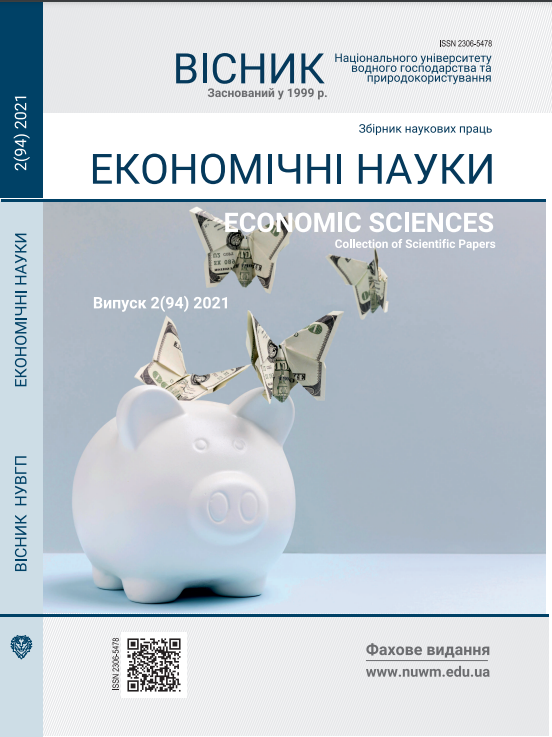СУЧАСНЕ УПРАВЛІННЯ БІЗНЕСОМ: ОЦІНКА ВІДМІННОСТЕЙ ЗА КОНЦЕПЦІЄЮ TQM ТА МІЖНАРОДНИМИ СТАНДАРТАМИ
DOI:
https://doi.org/10.31713/ve2202121Ключові слова:
управління бізнесом, концепція TQM, міжнародні стандарти, ІSО 9001, 2015, система управління якістю, експертна оцінка, інтегральна оцінка, ваговий коефіцієнт.Анотація
У статті розглянуто питання щодо забезпечення економічного зростання країни, конкурентних позицій вітчизняних суб’єктів господарювання на міжнародних ринках. Встановлено, що в основі успішного сучасного бізнесу лежить управління якістю як одне з ключових функцій менеджменту, управління бізнесом, основним засобом досягнення та підтримки конкурентоспроможності підприємства будьякої сфери діяльності. Розглянуто переваги та недоліки в управління бізнесом за концепцією TQM (загального управління якістю) та міжнародними стандартами. Визначено основні критерії, за якими розрізняють відмінності у підходах до управління якістю. Здійснено інтегральну оцінку відмінностей в управлінні бізнесом за концепцією TQM та міжнародними стандартами, з використанням 5-бальної шкали та вагових коефіцієнтів. Проведені дослідження та інтегральна оцінка відмінностей за концепцією TQM та міжнародними стандартами ІSО серії 9000 свідчать про пріоритетність останніх. Обґрунтовано, що сучасні підходи і методи щодо управління бізнесом нерозривно пов’язані зі створенням цілісної та дієвої системи управління якістю відповідно до вимог міжнародного стандарту ISO 9001:2015. Це є ефективним засобом гарантування споживачам належної якості товарів, послуг (робіт), підвищення їхньої конкурентоспроможності, досягнення ключових цілей бізнесу.Посилання
Орлова К. Є. Управління бізнесом : підручник. Житомир : Державний університет «Житомирська політехніка», 2019. 319 с.
Бондаренко С. М., Строкач І. А. Особливості використання соціально-орієнтованої концепції загального управління якістю TQM в Україні. Технології та дизайн. 2014. № 1 (10). URL: https://knutd.edu.ua/publications/pdf/TD/2014-1/7.pdf (дата звернення: 25.05.2021).
Капінос Г. І., Ларіонова К. Л., Липчак М. І. Проблеми та перспективи впровадження концепції загального менеджменту якості (TQM) на вітчизняних підприємствах в умовах євроінтеграції. Вісник Хмельницького національного університету. Економічні науки. 2019. № 4. С. 100–105.
Траченко Л. А. Застосування соціально-орієнтованої концепції загального управління якістю на підприємствах сфери інжинірингових послуг. Підприємництво і торгівля : зб. наук. праць / редакц. кол.: Куцик П. О., Апопій В. В., Семак Б. Б. та ін. 2019. Вип. 25. С. 99–105.
Прокопів Ю. В. Міжнародні стандарти якості в Україні та їх важливість в управлінні організацією. Young Scientist. 2015. № 11(26). С. 81–85.
Лазоренко Т. В., Голуб М. О. Економічні аспекти застосування сучасних концепцій менеджменту на вітчизняних підприємствах. Економіка та управління підприємствами. 2019. Вип. 1 (18). С. 139–143.
Маркова С. В., Чкан А. С., Олійник О. М. Управлінські підходи до формування системи менеджменту якості підприємства засобами розвитку персоналу та самоменеджменту. Актуальні проблеми економіки. 2014. № 7 (157). С. 194–201.
Янковець Т. М., Лазарєва М. О. Сучасні концепції менеджменту: закордонний досвід. Інформаційно-аналітичне забезпечення ефективності діяльності підприємств у контексті економічної безпеки в умовах інтеграції з ЄС : матеріали Міжнародної науково-практичної інтернетконференції, 27 травня 2016 р., м. Київ. К. : КНУТД, 2016. С. 205–207.

